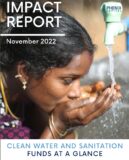Phenix Capital Group has released today its Impact Report on Clean Water & Sanitation, sharing historical and compiled data from its’ Impact Database over investments towards SDG 6. Data reveals that capital commitments towards SDG 6 have reached €75 billion, being €41 billion raised by public equity. SDG 6 is meant to solve one of the most urgent issues of our time, the global water and sanitation crisis, but efforts still have a way to go: SDG 6 has seen a 75% decline over the past four years.
Additionally, the report contains an exclusive interview with Matt Damon and Gary White, who are the co-founders of Water.org and WaterEquity, an asset manager exclusively focused on solving the global water and sanitation crisis. They invest in financial institutions, enterprises, and infrastructure in emerging markets delivering access to safe water and sanitation to low-income communities.
“I saw this enormous daily expense and realized that families could be healthier, more productive, and even better educated if they could access financing for these lasting water and sanitation improvements to their lives”, says Gary White.
“It just hit me how access to safe water has a profound impact on an individual, a family and an entire community. I just can’t think of a cause that has a larger impact than access to safe drinking water and basic sanitation — especially for women and girls”, told, Matt Damon.
Key report takeaways
- The total capital committed towards SDG 6 has seen a 75% decline over the past four years. Meanwhile, new funds being launched have continued on a steady trajectory, resulting in contrasting expectations.
- Within SDG 6, over two-thirds of the capital allocation is geared towards the impact theme ‘Water and Sanitation Efficiency’.
- Private equity has the greatest number of funds committed to SDG 6. However, in terms of capital committed, private equity funds raised just 10 billion while public equity raised 41 billion euros.
- Investors targeting SDG 6 favour putting their capital in funds targeting global markets, rather than directly into emerging or developed markets.








